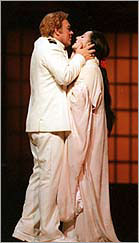A Soprano's Debut and a Conductor's for 'Madama'
'Madama Butterfly' at the Metropolitan Opera
ANTHONY TOMMASINI
01/08/00
For all its familiarity, Puccini's "Madama Butterfly" is a hard opera to cast. When we meet her in Act One, Cio-Cio-San, the title character, is a worldly 15-year-old, overcome with love for Lieutenant Pinkerton, the hearty American naval officer who has swept into her life and hastily arranged a marriage, rescuing her from a humiliating life as a geisha.
 |
|
| Vladimir Galouzine and Sylvie Valayre in "Madama Butterfly." (Sara Krulwich/The New York Times) | |
To portray her, a soprano must have fragility and tender lyricism in her singing and demeanor. Yet Cio-Cio-San has had a hard youth, which is reflected in the music. Whole stretches of the role require penetrating tone and the stamina to soar.
The great Mirella Freni refused repeated requests to undertake it until Herbert von Karajan, who had Svengali-like power over sopranos, persuaded her to at least record the opera with him.
The Metropolitan Opera revived Giancarlo del Monaco's scrupulously realistic 1994 production on Thursday night, and naturally the focus of attention was the French soprano Sylvie Valayre, who made her Met debut as Cio-Cio-San. Local operagoers may remember Ms. Valayre from her intrepid performance last year in the taxing role of Helene in Verdi's "Jerusalem" with the Opera Orchestra of New York.
Ms. Valayre has been all over the soprano terrain in her choice of roles: Norma, Tosca, Salome, Abigaille in "Nabucco." Her performance on this occasion suggested that she is essentially a lyric soprano who has by sheer determination boosted her sound to sing these heavy roles.
Dramatically, she made a lovely, vulnerable and, as the tragedy unfolds, impassioned Cio-Cio-San. Her singing was confident and often striking. A certain stridency of tone may be the result of her taxing repertory. When she contained her voice and shaped delicate phrases in her middle range, her singing had poignancy and beauty. Her high notes came with effort, but she did not shrink from them. If this was not an exceptional Cio-Cio-San, she made the role work on her own terms. She certainly reached the audience, who gave her a standing ovation.
The Russian tenor Vladimir Galouzine, who sang Pinkerton, made his Met debut in 1994 singing impressively as Sergei in Shostakovich's "Lady Macbeth of Mtsensk," and he will return in that role this season. His Russian voice, with its husky cast and slightly nasal tone, is not ideal for Puccini. He sings with power but not much subtlety. On this night his top notes were notably shaky. Still, he has the breath control to project long lines, and there was no lack of energy or ardency in his portrayal.
The mezzo-soprano Jane Bunnell was a vocally strong and sympathetic Suzuki. The tenor Bernard Fitch was a suitably slick Goro, and the baritone William Shimell was an elegant Sharpless, the well-meaning but weak-willed American consul.
The Swiss-born conductor Marcello Viotti, recently appointed principal conductor of the Bavarian Radio Orchestra, made his Met debut. After a nervous start in which the strings sounded a bit scrambled, he conducted with a just balance of vigor and pliancy. With a new cast and conductor, there was a gratifying sense that, whatever the results, this repertory staple had been approached afresh.